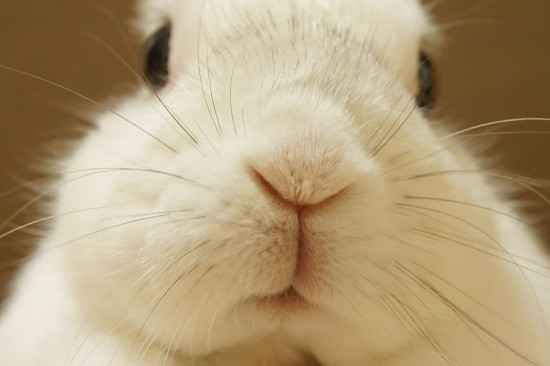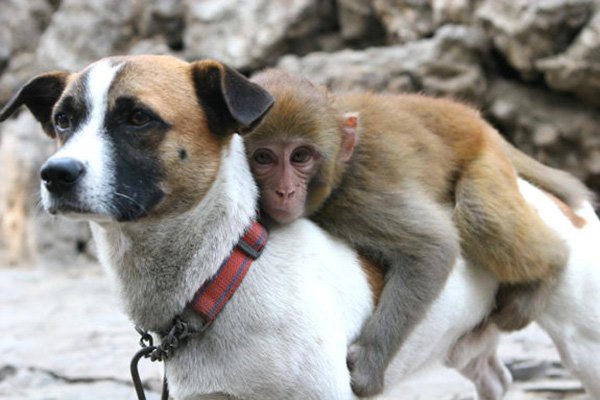

Fact Number 1: Research shows that the biggest factor in rabbit welfare issues comes from owners not knowing enough about the animal before they buy. The RWAF (Rabbit Welfare Association) runs many educational programmes to try to address this problem. And one of their main themes is 'A HUTCH IS NOT ENOUGH.' (Rabbit hutches should be large enough for a rabbit to hop at least three hops in any direction and high enough for them to stand up on their hind legs at full stretch. As well as this they should have constant access to an exercise space that is, at a minimum, three times larger again than the hutch space.)
Fact Number 2: Rabbits are gregarious creatures and in the wild live in 'herds'. The domesticated rabbit is no different in needs and it is not recommended that a rabbit is kept singly. This is especially so for the outdoor rabbit that does not have as much human contact as the house rabbit.
Fact Number 3: A Rabbit's diet is made up of 95% dried and fresh grasses - commercially produced food such as pellets and mixes are not absolutely necessary and should be fed sparingly alongside the fibre rich hay and grass. Rabbits need fibre to remain healthy. Their bodies are specifically designed for this. It also helps to keep their teeth in good order as the chewing action helps stop the teeth from overgrowing. Like us they enjoy a selection of foods - but it is not good to overfeed on fruit and vegetables as this can lead to stomach upsets. Leafy greens as well as dandelion leaves are good foods for the rabbit. Fresh, clean water should made available every day.
Fact Number 4: Rabbits Purr.... yes, a happy rabbit makes a sound very similar to a cat. If you have never heard your rabbit purr then you need to ask yourself why!
Fact Number 5: Rabbits dislike being held in the air - in the wild a rabbit is a prey animal and as such will always associate any form of lifting as a potential threat. It is fare better for you to get down to their level and let them approach you. Never try to lift a rabbit by its ears.
Fact Number 6: Rabbits can start breeding from a young as 4-6 months. It is not a good idea to breed from your rabbit - there is something like 36.000 rabbits taken into rescue homes each year and many of these come from unwanted litters. Also female rabbits that are not spayed have a significantly higher instance of uterine cancer.
Fact Number 7: Rabbits are crepuscular - this means most active at dawn and at dusk.
Fact Number 8: A rabbit's ears are very sensitive - they can turn in any direction and are in effect a rabbit radar system. They also help a rabbit to regulate body temperature and in summer can be lightly misted with cool water to help against heatstroke.
Fact Number 9: Rabbit teeth never stop growing and it is very important to keep a regular check on them. Some signs of overgrown teeth are lack of appetite, listlessness and weight loss. Always seek expert advice about this.
Fact Number 10: Rabbit eyes are situated on the sides of their head for a specific reason - as a prey animal this means they can see behind them without turning round, which saves valuable seconds when it comes to escaping a predator.
Fact Number 11: It is entirely possible to litter train a rabbit - rabbits are by nature very clean animals and you may well notice that they always use one corner of the hutch. You can us this to your advantage with your house rabbit by placing a clean litter tray filled with bedding - simply make your rabbit aware it is there a couple of times and you will find they automatically use it.
Fact Number 12: Rabbits live for between 4 - 8 years. Giant Rabbits generally live shorter lives - approx 4 -5 years. Dwarf breeds have a longer life span and can live for as long as eight years and in some rare cases, it has been documented, for even longer. It is though, well to be aware of this before taking the step to buy. It is not a commitment to be taken lightly and one must plan appropriately for times when you are away from the home, whether it be just for one day or longer.
Fact Number 13: Rabbits do not make good pets for children - as prey animals rabbits are easily frightened and as such do not always fare well around children who can tend towards being noisy and boisterous. Rabbits can die from fright - loud noises and sudden bursts of movement will make a rabbit freeze with fear, this can lead to heart attack and death. It is recommended by the RWFA that parents take the full responsibility for the rabbit's welfare and that children should always be accompanied by an adult whenever they handle them.
By taking the time to find out more about our rabbits we will not only enhance their lives but also our own enjoyment of them. In general people equate their size to the amount of effort it will take to maintain their needs and yet in reality nothing could be further from the truth. A happy and healthy rabbit will display many fun traits and return the care you give them with a very genuine affection akin to that of any good dog or cat.
 Yorkshire Terrier Health And Wellness
Yorkshire Terrier
Yorkshire Terrier Health And Wellness
Yorkshire Terrier
 What should Dog Food contain ?
What should Dog Food contain ?
The point of yo
What should Dog Food contain ?
What should Dog Food contain ?
The point of yo
 How To Keep A Young Bergamascos Coat Looking Good
How To Keep A You
How To Keep A Young Bergamascos Coat Looking Good
How To Keep A You
 10 Of The Most Affectionate Dogs On The Planet
10 Of The Most Af
10 Of The Most Affectionate Dogs On The Planet
10 Of The Most Af
 How Helpful Can Toys Be In Treating Your Pet's Aggression?
How Helpful Can Toys Be In Treating Your Pet's Aggres
How Helpful Can Toys Be In Treating Your Pet's Aggression?
How Helpful Can Toys Be In Treating Your Pet's Aggres
Copyright © 2005-2016 Pet Information All Rights Reserved
Contact us: www162date@outlook.com